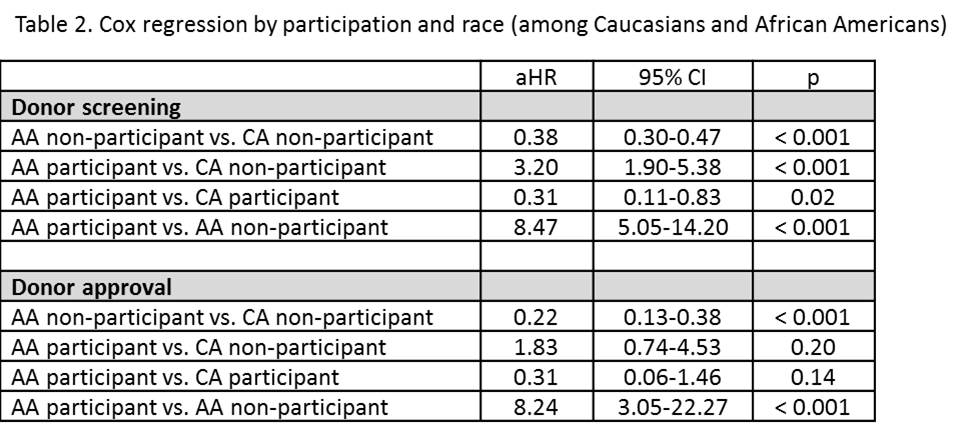Enhanced Advocacy and Health Systems Training through Patient Navigation Increases Access to Living Donor Kidney Transplantation
1University of Alabama at Birmingham, Birmingham, AL, 2Tuskegee University, Tuskegee, AL
Meeting: 2019 American Transplant Congress
Abstract number: B253
Keywords: African-American, Donation, Kidney transplantation
Session Information
Session Name: Poster Session B: Kidney Living Donor: Quality and Selection
Session Type: Poster Session
Date: Sunday, June 2, 2019
Session Time: 6:00pm-7:00pm
 Presentation Time: 6:00pm-7:00pm
Presentation Time: 6:00pm-7:00pm
Location: Hall C & D
*Purpose: No living donation program has addressed transplant candidate factors by separating the advocacy role from the candidates while simultaneously addressing potential living donor concerns in the evaluation process through enhanced healthcare systems training. We developed the Living Donor Navigator (LDN) program to promote both advocacy and systems training among transplant candidates and their potential living kidney donors and examined its impact on living donor kidney transplantation (LDKT).
*Methods: We performed a retrospective single center cohort study of adult kidney-only candidates awaiting LDKT. Using time varying Cox proportional hazards regression, we explored likelihood of living donor screening (advocacy training assessment) and approval (systems training assessment) by participation in the LDN program.
*Results: The cohort consisted of 56 LDN participants and 1,948 non-participants (standard of care). Participants differed from non-participants in dialysis vintage and distance from our center, with participants living approximately 60 miles closer than non-participants (Table 1). Participation in the LDN was associated with a 9-fold increased likelihood of living donor screenings (adjusted HR (aHR): 9.27, 95%CI: 5.97-14.41, p<0.001) and a 7-fold increased likelihood of living donor approval (aHR: 7.74, 95%CI: 3.54-16.93, p<0.001) compared to standard of care. Further comparisons by participant race demonstrated higher likelihood of donor screening and a similar likelihood of approval among African Americans compared to Caucasians (Table 2).
*Conclusions: These data suggest that both advocacy and systems training are needed to increase actual LDKT rates, and that LDN programs may mitigate existing racial disparities in access to LDKT.
To cite this abstract in AMA style:
Reed RD, Kumar V, Berry B, Hendricks D, Carter A, Shelton BA, Mustian MN, MacLennan PA, Qu H, Hannon L, Yates C, Hanaway MJ, Locke JE. Enhanced Advocacy and Health Systems Training through Patient Navigation Increases Access to Living Donor Kidney Transplantation [abstract]. Am J Transplant. 2019; 19 (suppl 3). https://atcmeetingabstracts.com/abstract/enhanced-advocacy-and-health-systems-training-through-patient-navigation-increases-access-to-living-donor-kidney-transplantation/. Accessed February 26, 2026.« Back to 2019 American Transplant Congress


